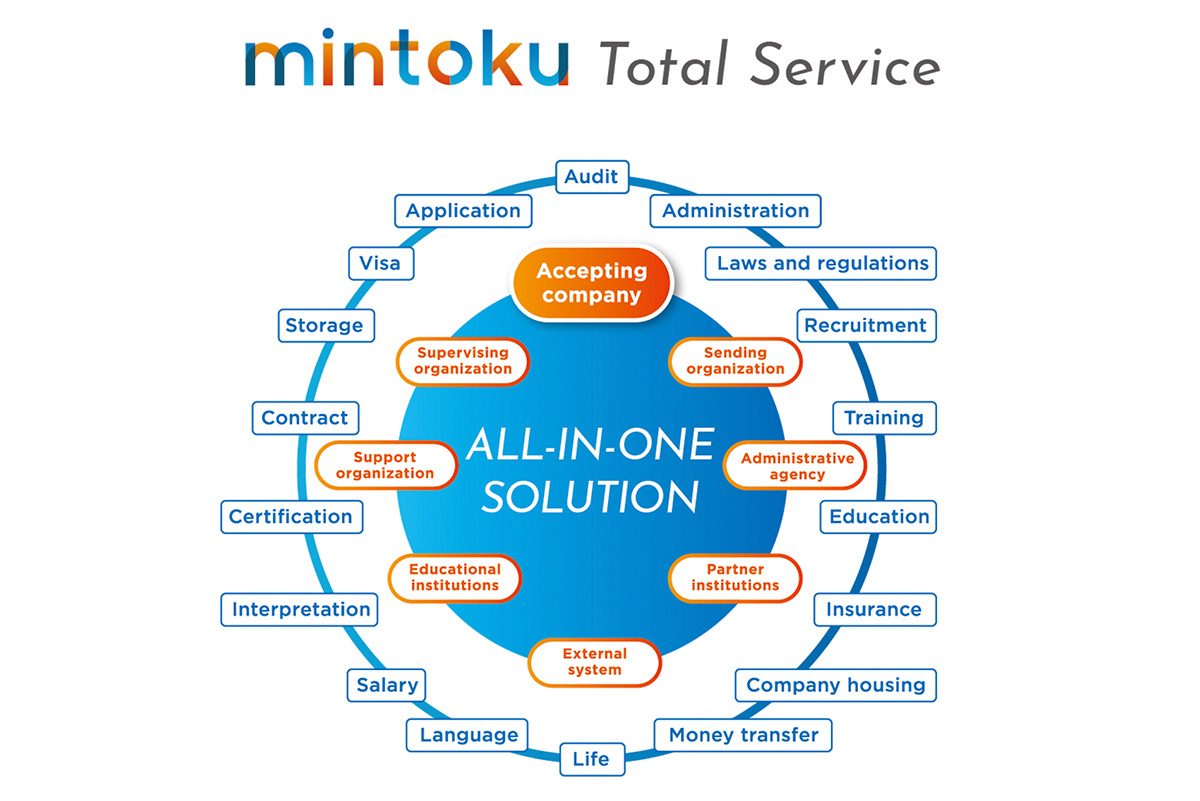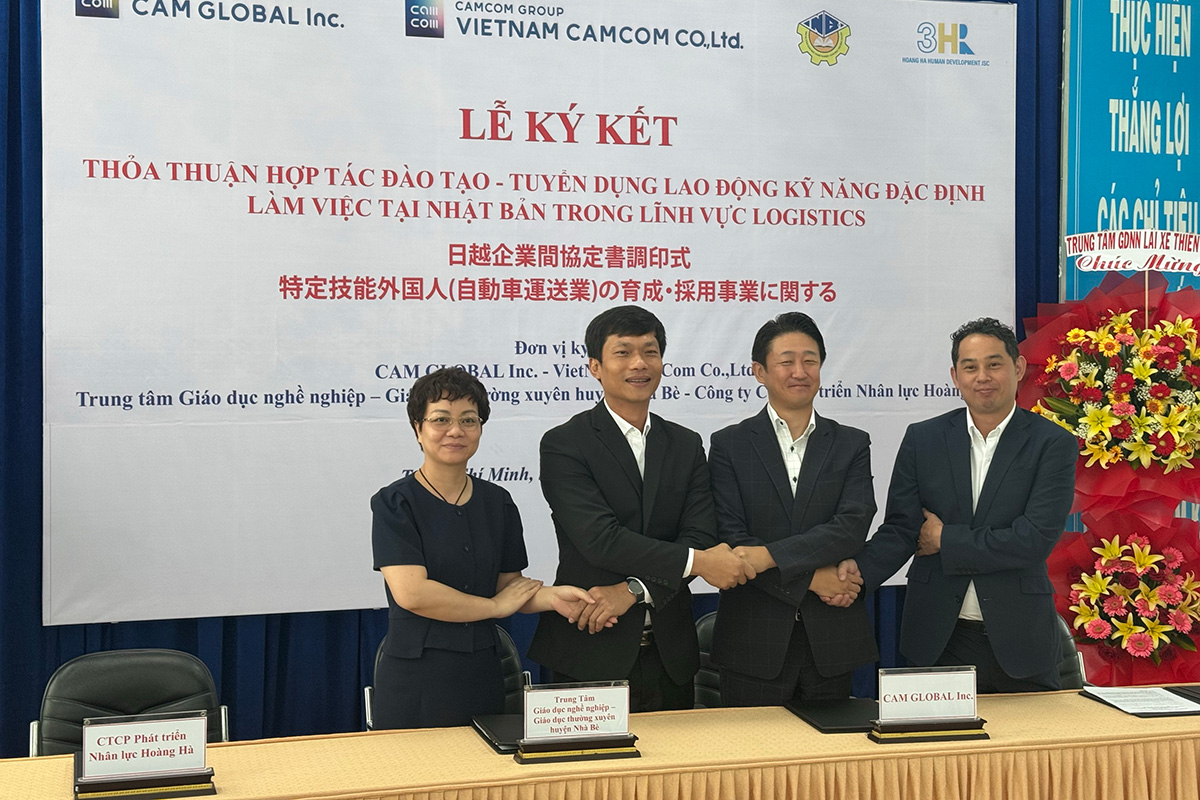In this interview for The Worldfolio, Mr. Toshihiko Miyabayashi, CEO of CAMCOM Group, explains how the company is redefining workforce solutions through innovation, digital integration, and a global outlook to address Japan’s labor challenges.

Japan is facing significant challenges due to its demographic shift, including an aging population, a shrinking market, and recruitment difficulties from a smaller labor pool. With an estimated shortfall of 11 million workers by 2040, how is this demographic trend impacting the staffing business, and to what extent should Japanese companies rely on overseas talent for business continuity?
Population decline is a critical issue in Japan, prompting the implementation of countermeasures such as automation and labor-saving equipment. However, the introduction of foreign labor has also become an essential component of addressing this challenge. Allow me to briefly explain the pivotal role that staffing agencies like ours play in this evolving landscape.
While companies continue to invest in automation, the need for human labor persists. Securing this manpower has grown increasingly complex. As a staffing agency, our responsibility is to provide clients with the right human resources—a role that has become ever more significant. However, simply hiring people is not enough to meet our clients' goals. To genuinely enhance productivity, we must go beyond recruitment by offering tailored training and support programs. This dual focus ensures that the workforce we supply not only meets immediate needs but also contributes to our clients’ long-term success.
At the core of our company’s philosophy is the concept of "creating good jobs." This mission carries two distinct meanings. First, it refers to work that enables individuals to achieve their personal and professional aspirations. Second, it involves contributing to the profitability and success of the companies we serve. By aligning these two objectives, we emphasize the importance of creating corporate value through meaningful work.
Our outsourcing business reflects this philosophy by supporting clients in ways that extend beyond simply introducing new technology. True productivity gains come from an integrated approach—leveraging both automation and human expertise. This combination is where the uniqueness of the CAMCOM Group lies: our ability to seamlessly provide technological solutions alongside skilled workforce support.
When it comes to overseas labor, it has become an undeniable necessity for the growth of Japanese companies. To remain competitive, Japan must position itself as an attractive destination for foreign workers by offering competitive salaries and fostering an environment conducive to professional and personal growth. A robust infrastructure is essential to support these workers, enabling them to achieve their career goals while contributing to the Japanese economy. Our vision is for foreign workers to gain valuable skills and experiences in Japan, which they can then share upon returning to their home countries, creating a virtuous cycle of knowledge and opportunity.
It is also critical for Japan to build a transparent and inclusive framework that supports this process. This structure will help individuals realize their potential and encourage more high-skilled professionals, such as engineers, to contribute to Japan’s industries. Restricting opportunities in critical sectors, such as semiconductors, to Japanese nationals only will ultimately hinder innovation and growth. By embracing a diverse and global workforce, Japan can unlock new opportunities and drive sustainable development across industries.
With a record 2 million foreign workers in Japan, integration remains a significant challenge. Many foreign workers face difficulties navigating Japan's unique job market and overcoming bureaucratic hurdles, such as complex visa processes and administrative requirements. What support systems has the company implemented to address these challenges and help foreign workers integrate more effectively into the workforce?
First, we focus on ensuring the provision of comprehensive foreign worker assistance. We offer an all-in-one support solution that encompasses various aspects, including visa applications and life support services. These are delivered through a combination of face-to-face interactions and IT solutions, ensuring both accessibility and personal connection.
One significant challenge tied to Japan's declining population is the issue of skill inheritance. When skilled employees retire, their invaluable techniques and expertise are often at risk of being lost. With the workforce evolving rapidly and the integration of digital technologies accelerating, it has become essential to focus on upskilling and reskilling workers to meet future demands.
From this perspective, we prioritize providing accessible solutions to facilitate this transition. For example, we offer user-friendly applications with intuitive interfaces that are available in multiple languages. These tools help bridge gaps, making our training and development programs more inclusive and effective for a diverse workforce.

LOGITECH Co., Ltd., one of your subsidiaries, has developed a series of solutions to Japan's '2024 Problem' in the logistics sector. This issue stems from upcoming labor law reforms limiting truck drivers' overtime working hours, further exacerbating an industry already facing a labor shortage. What is the company's perspective on addressing these challenges, and how does your “Logipalette” platform help solve the '2024 Problem'?
The '2024 problem' extends beyond the truck drivers themselves. It is fundamentally tied to a broader issue—the shortage of manpower, including a shortage of warehouse workers and the growing demand for e-commerce, which is exacerbated by the introduction of stricter regulations. Additionally, the layers of logistics in Japan have become increasingly sophisticated and complex, making it challenging for many to navigate.
To address these challenges, our subsidiary LOGITECH offers innovative solutions through its “Logipalette” platform. Logistics is comprised of six key functions (storage, cargo handling, distribution processing, packaging, transportation and delivery, and information systems). This platform directly matches shippers with various resources such as warehousing, transportation and delivery, human resources, and automation solutions through its extensive partner network, thereby making a significant contribution not only to addressing labor shortages but also to improving the efficiency of the entire logistics process. In addition, Logipalette has been well received for its flexibility in arranging “what you need, when you need it, and in the amount you need it” for logistics operations, which fluctuate widely from season to season, especially as the type and scale of resources can change when businesses expand.

Our approach focuses on connecting businesses across the shortest possible distance while preserving the fundamental structure of the logistics process. A key element is creating a system that optimizes resource utilization and minimizes idle capacity. For instance, we improve warehouse efficiency by sharing underutilized spaces among multiple shippers and targeting demand for last-mile deliveries by employing drivers with standard licenses, providing them with practical training and assignments. This not only maximizes efficiency but also fosters a more sustainable and cost-effective logistics ecosystem.
Our unique service model, Logistics as a Service (LaaS), offers tailored solutions for individual shippers, in contrast to the traditional 'logistics as infrastructure' model where shippers must conform to standard regulations. This innovative approach stems from our expertise as a human resources company and reflects our commitment to creating flexible and customized logistics solutions.
The company has experienced remarkable growth, more than doubling its revenue over the past 8 years to surpass JPY 120 billion in sales in 2023. What are the key drivers behind this growth?
The drivers behind our growth are closely tied to our core strengths. At the heart of our business are temporary staffing, placement, and employment/career support services. What sets us apart is our expertise to combine these areas with innovative digital solutions that enhance productivity. This dual focus—on human resources and system design capabilities—forms the foundation of our success.
One of our key advantages is our commitment to creating a platform that supports diversified work styles, catering to individuals from a wide range of backgrounds. For example, we provide tailored opportunities for members of the senior generation or those seeking part-time work. By offering optimal work arrangements that align with each individual's circumstances, we ensure both inclusivity and adaptability in meeting the needs of a changing workforce.
Despite Japan's demographic challenges, the working population has increased due to better utilization of underrepresented groups such as women, the elderly, and individuals with disabilities. What services does the company offer to maximize the potential of these segments and integrate them effectively into the workforce?
In 2012, we established a subsidiary specializing in employing people with disabilities under the concept of 'not just welfare, but business competitiveness.' Today, our group employs over 230 individuals with disabilities. A key strength of this subsidiary is its expertise in supporting individuals with mental and developmental disabilities, whose numbers have increased significantly and who often require specialized consideration.
Building on this expertise, we have expanded into a service that matches these talented individuals with other companies, helping them contribute meaningfully to the workforce. Our operations now include 16 employment support centers across Japan, offering skills training and mindset development to ensure smooth workplace integration. Additionally, we launched 'SAKURA TechBloom,' a training program for IT engineers—an area of high demand—providing tailored support to help participants achieve their career goals and make a meaningful impact in various fields."
We have established cooperative relationships with over 300 client companies, offering consulting and other services to support the employment of people with disabilities. One key offering is our 'Social Office' service, where job coaches are stationed at client companies to provide comprehensive support for teams of employees with disabilities. To date, we have supported nearly 400 employees with disabilities by creating thoughtfully designed environments that enhance both comfort and productivity, covering aspects from business operations to mental health support.
For working parents, we operate two childcare facilities in Japan to provide flexible and comprehensive support. In addition to regular childcare services, we offer extended hours to meet diverse needs, creating a seamless system that balances professional and personal responsibilities. By sharing access to these facilities, partner companies can effectively promote women’s workforce participation and retain top talent without the burden of establishing and managing their own daycare centers.
Can you tell us more about your international expansion, and especially the program you began in Indonesia in collaboration with the Indonesian Government?
Our efforts in Indonesia are being developed through the Indonesia-Japan CAMCOM (IJC) program, in collaboration with the Ministry of Manpower and other major organizations. This program provides comprehensive support for technical intern trainees working in Japan, with a unique feature that sets it apart from conventional internship programs. Under this initiative, the Indonesian government pays educational subsidies to each trainee, significantly reducing the financial burden traditionally associated with technical training.
Additionally, we recruit highly qualified individuals from state-run vocational training schools and provide a robust support system to ensure their success. Trainees receive Japanese language training prior to their arrival and participate in programs at our residential training facilities to learn about Japanese work culture and lifestyle before joining a company. At the company’s request, trainees can also acquire specialized knowledge tailored to their future roles. This approach not only alleviates the training burden on employers but also establishes a strong foundation for the trainees' career development."
This program has been made possible thanks to the invaluable support of our partners. Looking ahead, we aspire to implement similar initiatives in Vietnam and other countries. However, since governmental schemes vary across nations, adjustments will be necessary to tailor the program to each region's unique requirements. Our vision is to expand internationally, leveraging this model to create opportunities and foster mutual growth across borders.
What do you consider to be the company’s greatest strength, and how will you leverage on this strength to continue expanding?
One of our greatest strengths lies in the robust foundation we’ve built as a staffing agency, with a network of over 12,000 clients. This extensive client base enables us to gain real-time insights into their specific needs, allowing us to adapt and respond effectively. Additionally, we have over 33,000 people currently working through our services, which has allowed us to accumulate a wealth of practical know-how over the years.
By understanding both the needs of our clients and the aspirations of the workers, we are uniquely positioned to bridge the gap between the two. Combining this deep expertise with our advanced technological systems, we deliver multifaceted and comprehensive solutions that set us apart from our competitors.
Many of the solutions CAMCOM is implementing are highly relevant to Japan’s needs but could also be applicable internationally. Are there specific services, products, or solutions you believe could scale to global markets and address similar challenges in other nations?
We have high aspirations for expanding our services to international markets; however, we recognize that each country has its own unique labor environment. What sets our company apart is our ability to provide thorough and tailored support to both corporations and workers, ensuring that their specific needs are met with precision and care.
Our approach to international expansion prioritizes collaboration. Once strong partnerships with local companies and organizations are established, we focus on providing the necessary elements and business models to empower our partners to maximize their capabilities, rather than operating independently.
For example, in response to the automobile transportation industry becoming subject to the Specified Skill System last year, we entered into an agreement with a Japanese language boarding school and a Vietnamese driving school. This driving school has a long track record and trains around 2,000 drivers annually. With this collaboration, we have established a framework to train drivers in Vietnam for the Japanese market, allowing Japanese companies to hire them. As part of this initiative, the hiring of Vietnamese drivers is set to begin this year, with plans to recruit several hundred drivers.
 Japanese language boarding school
Japanese language boarding school
Additionally, we have partnered with a local human resource company and training center. At the request of the Vietnamese government, this local partner was asked to lead a program to support workforce development and recruitment for Japanese companies operating in Vietnam. By leveraging our expertise and tailoring solutions to local needs, we aim to create strategies that drive mutual success for all parties involved.
 Signing ceremony
Signing ceremony
Looking at the future, what new products, services, or areas would you like to expand into?
Rather than simply introducing entirely new services, our focus is on strengthening and enhancing our existing businesses. There is significant potential for further development within our current offerings. For instance, we see opportunities to upscale our driver skill development initiatives in the logistics sector. We also plan to expand our business in Asia by combining logistics and foreign human resources businesses.
The core of our expansion strategy lies in delving deeper into our established areas of expertise. By doing so, we aim to provide even more comprehensive and effective solutions to meet the evolving needs of our clients and the industries we serve.
What goals do you hope to achieve in the next 5 years?
Our approach to client services prioritizes designing essential solutions by integrating the knowledge and expertise gained from our in-house practices. Rather than simply dispatching human resources, we proactively address complex human resource management challenges faced by our clients. For example, when consulted about these complexities, we develop customized human resource management systems, refining their functionality in real-time by incorporating feedback directly from the sales floor. This agile approach has earned overwhelming support from our clients.
In industries like logistics, where a deep understanding of operations is critical, we take a hands-on approach by owning and operating our own warehouses as a 3PL provider. This firsthand experience allows us to fully comprehend industry challenges and translate those insights into tailored services for our clients.
Our most valuable asset driving these innovations is our human resources. Unlike companies reliant on fixed assets, our strength lies in the exceptional talent and dedication of our employees across sales, engineering, and back-office functions. Together, these efforts drive our success, instill pride in our organization, and enable us to make a meaningful impact for those we serve. This commitment defines who we are and what we stand for.

For more information, visit: https://cam-com.inc/
To read more about CAMCOM Group, check out this article about them
0 COMMENTS